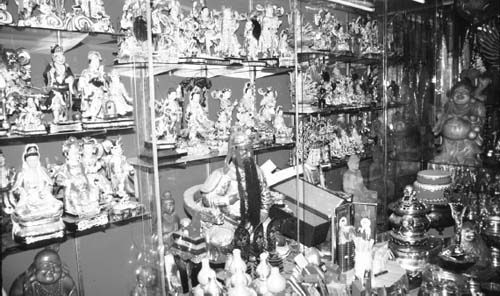Daoism and CctLeadership, Authority, and Religious Roles |
Who is Guan Di and why is he so important? |
Like the Jade Emperor, Guan Di (also known as Guan Gong) claims a place in both Daoist and CCT pantheons. He has the additional distinction of ranking high in the upper echelons of the imperial cult, and through that channel connects with Confucian tradition as well. Guan Di was originally a military man of the third century, named Guan Yu, who was executed after enemies of the Han dynasty captured him in battle. The court funded temples in his honor and publicized his cause. Meanwhile, the newly deified Guan Di was gaining popularity among practitioners of CCT as a refuge from problems as diverse as illness, bad weather, and failing business. The ever-ready all-purpose deity thus rose to such prominence that his popular cult situated him above even the Jade Emperor. In the seventeenth century a Ming dynasty emperor conferred on Guan Di the title of Grand Emperor.
During the following regime, that of the Ching or Manchu, Guan Di received the title under which he is perhaps most widely known, Military Emperor or Wu Di, thus making him the official guardian of the empire. Guan Di’s celebrity represents a relatively recent development. Unlike many of the older deities, whose imagery and entourage were typically patterned on those of the imperial bureaucracy, Guan Di is reminiscent of the Buddhist Bodhisattva. In fact, some scholars suggest, Guan Di also was absorbed into certain Buddhist groups after the seventh century. It seems likely that, as in the case of other indigenous Chinese deities, Guan Di was first depicted under the general influence of Buddhism’s use of sculpture. He appears as a very tall man with a very long beard and a red face, sometimes accompanied by his son. Variant versions of his story give somewhat different details, as in the popular classic Chinese novel Romance of the Three Kingdoms, of which Guan Di is the hero. Many popular theatrical presentations based on the novel have become a major vehicle for the spread of Guan Di’s popularity.

Various deities available in a popular religious goods store, Keeling, Taiwan. Here you can find everyone in the several pantheons, from the red-faced Guan Di and other Daoist figures to Guan Yin and the jolly Buddhist figure on the right called Pu Tai.
